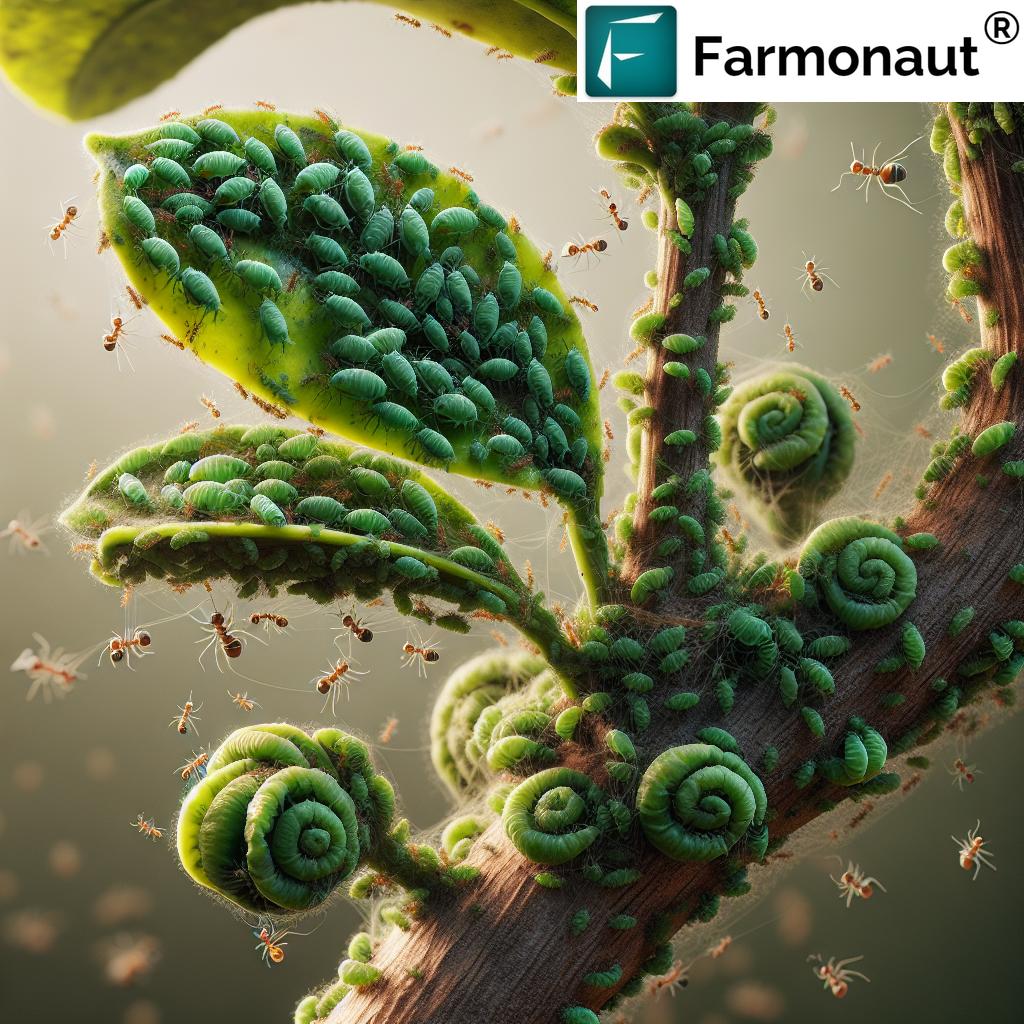How to Get Rid of Aphids on Lemon Tree: 7 Proven Solutions
Introduction
If you’re searching for how to get rid of aphids on lemon tree, you’ve come to the right place. Aphids, among the most common and damaging pests for lemon trees, pose ongoing challenges for both commercial and home growers. These tiny, soft-bodied insects feed on plant sap, causing stunted growth, distorted leaves, and reduced fruit yields. On top of direct damage, they can cause the transmission of plant diseases and attract ants, leading to further issues in your garden or orchard.
An integrated, strategic approach is vital for lemon tree pest control. In this comprehensive guide, we cover the seven most effective solutions for managing aphids on lemon trees, from cultural and natural methods to biological and safe chemical controls. You’ll learn the signs of aphid infestation, practical pest management tips, and preventative strategies for protecting lemon trees from pests.
Understanding Aphid Infestations on Lemon Trees
Lemon trees, like many citrus varieties, are especially favored by aphids due to their tender growth and abundant sap. Among the key lemon tree pests, aphids stand out not just for their prolific numbers but also for the intricate web of secondary problems they cause. There are over 200 species of aphids affecting citrus trees globally, with Aphis gossypii (cotton/melon aphid) and Aphis spiraecola (spirea aphid) being especially problematic.
“Over 200 species of aphids are known to infest citrus trees worldwide.”
Aphids reproduce rapidly; a single female can be capable of producing up to 60 offspring in one week — and with multiple generations produced annually, prolific reproduction can quickly overwhelm lemon trees. If left uncontrolled, aphid populations result in substantial damage, emphasizing the importance of swift and effective action.
Learning about aphid biology and behavior helps direct successful aphid management strategies. Aphids feed by piercing soft plant tissue and sucking out sap, which not only robs the tree of essential nutrients but also introduces toxins that deform new leaves, slow down growth, and set the stage for the transmission of diseases. The honeydew they produce encourages sooty mold growth and attracts ants, which then protect aphids in exchange for honeydew. This ant-aphid mutualism further complicates garden management.
For growers focused on maintaining productive, healthy lemon trees, understanding the interconnectedness of these challenges is crucial.
Signs of Aphid Infestation on Lemon Trees
- Curled, Distorted, or Deformed Leaves: Newly developing leaves may appear twisted, stunted, or malformed.
- Sticky Residue (Honeydew): Aphids excrete a sugary fluid called honeydew, which coats leaves and fruit, making them sticky to the touch.
- Sooty Mold: Honeydew encourages the growth of black, sooty mold fungi. Blackened surfaces on leaves and fruit indicate aphid activity.
- Visible Aphids: Colonies of tiny, soft-bodied insects (white, green, or black) clustered on undersides of leaves, new growth, or stems.
- Ants Attracted to Lemon Trees: Large numbers of ants foraging up and down the trunk — a strong indicator they are farming aphids for honeydew.
- Reduced or Stunted Growth: Trees show slow development, diminished vigor, and smaller overall size compared to healthy plants.
- Yellowing and Premature Leaf Drop: Infested trees may lose leaves early, and foliage can turn pale or yellow.
If left untreated, aphiddamage can escalate — leading not only to aesthetic injury but also to lower lemon production and increased susceptibility to disease. It is vital to inspect your lemon trees regularly for these signs of aphid infestation, especially during periods of rapid new growth.
Serious infestations also facilitate plant diseases transmitted by aphids, compounding the problem. Common diseases include Citrus tristeza virus, citrus vein enation virus, and various mosaic viruses, all of which can severely compromise the health and productivity of your orchard or garden.
Integrated Pest Management for Lemon Trees
Integrated Pest Management (IPM) is a holistic system that combines cultural, biological, and chemical strategies to minimize aphid impact while preserving beneficial organisms. Rather than relying exclusively on pesticides, IPM for lemon trees focuses on the harmonious balance between natural controls, habitat management, and, where necessary, carefully selected interventions.
Why Use IPM for Aphids on Lemon Trees?
- Reduces Aphid Populations Effectively: Multiple lines of defense prevent resistant aphid generations.
- Minimizes Environmental Impact: Limits excessive pesticide use, safeguarding pollinators and beneficial insects.
- Protects Fruit Quality and Yield: Early, consistent intervention supports healthier trees and better lemon harvests.
- Encourages Sustainable Lemon Tree Management: Balances cultural, biological, and chemical controls to create lasting protection.
Through a blend of pruning, cultural practices, biological controls, and targeted interventions, growers can reliably control aphids and other lemon tree pests for disrupted infestations or year-round prevention.
Modern platforms like Farmonaut empower farmers to further optimize timing and selection of IPM strategies. Farmonaut uses satellite-based monitoring and resource insights to help track and manage pest outbreaks, encouraging data-driven decision-making for cost-efficient and sustainable farming.
Now, let’s move to seven proven solutions for how to get rid of aphids on lemon trees, ranked for effectiveness, ease of use, and eco-friendliness.
How to Get Rid of Aphids on Lemon Tree: 7 Proven Solutions
When determining how to get rid of aphids on lemon trees, it’s important to tailor solutions to the size of the infestation, your available resources, and environmental goals. Here’s a deep dive into the best methods for lemon tree pest control:
1. Pruning and Sanitation: The First Line of Defense
- Regularly inspect and prune away infested branches and leaves to reduce aphid populations directly.
- Dispose of infested material far from your garden to prevent re-establishment.
- Improves air circulation and deters pest establishment.
- Helps limit the spread of sooty mold and plant diseases by reducing honeydew sources.
Tip: Always use disinfected pruning tools to avoid spreading pathogens.
2. Physical Barriers and Ant Management
- Sticky bands (like Tanglefoot) applied around tree trunks prevent ants from climbing the tree and protecting aphids.
- Use ant baits or stakes at the base of the tree to reduce ant populations, indirectly reducing aphid numbers.
- Prune branches touching walls, posts, or other plants to eliminate ant access pathways.
- Indirectly reduces aphid populations by cutting off their mutualistic defenders (ants).
Ant control interrupts the protective relationship between aphids and ants, making aphid colonies more vulnerable to predators and weather.
3. Water Sprays: Simple but Effective
- A sharp blast of water from a garden hose will physically dislodge aphids from lemon leaves and stems.
- Removes honeydew, sooty mold, and disrupts colonies — most dislodged aphids will not return.
- Repeat every few days during peak infestation periods, especially on young or tender foliage.
Water sprays are low-cost, chemical-free, and safe for beneficial insects, though less practical for large, mature trees.
4. Encourage Natural Predators (Biological Control of Aphids)
- Release or attract ladybugs (ladybird beetles); both adults and larvae devour dozens of aphids daily. Plant dill, fennel, or yarrow to draw them in.
- Lacewing larvae (“aphid lions”) are voracious aphid predators — increase their presence by growing flowering herbs and providing undisturbed microhabitats.
- Hoverflies (Syrphid flies): Their larvae aggressively feed on aphids while adults are attracted by pollen-rich flowers.
- Introduce parasitic wasps (e.g., Aphidius colemani) which lay eggs inside aphids; the developing larvae consume the aphid from within.
- Early evening releases, accompanied by light misting, maximize survival of beneficials.
Supporting a diverse, flowering garden boosts populations of these natural predators — critical allies for sustainable aphid management.
Want to optimize the timing and scale of beneficial insect releases based on real-time crop data? Explore Farmonaut’s AI-based crop plantation and advisory tools for precision interventions.
5. Insecticidal Soaps and Horticultural Oils
- Organic insecticidal soap sprays are designed to penetrate and destroy aphid cell walls, causing quick population reduction.
- Horticultural oils (e.g., neem oil, mineral oil): These suffocate aphids, eggs, and even sooty mold spores.
- Always apply during cooler parts of the day to prevent leaf burn. Coat leaves’ undersides for thorough coverage.
- Safe for most pollinators and minimal environmental side effects when used as directed.
Both options are ideal components of natural aphid control and are widely available at garden centers.
6. Systemic Insecticides (Least Preferred; Use as Last Resort)
- Modern, citrus-compatible systemics (like imidacloprid) are absorbed by the plant and kill aphids upon feeding.
- Apply strictly according to label instructions to avoid harming non-target insects and beneficial predators.
- Systemics can affect fruit safety — observe pre-harvest intervals carefully.
Chemical controls should be reserved for severe, persistent infestations that do not respond to other methods. Minimize use to protect beneficial organisms.
7. Citrus Essential Oil and Homemade Remedies
- Citrus peel extracts (including lemon oil) contain limonene and related compounds with proven insecticidal properties.
- Homemade citrus sprays: Steep lemon peels in warm water, strain, and spray directly onto aphid clusters. Laboratory studies show reduced aphid populations with regular use.
- Low toxicity for non-target organisms, but may require more frequent applications.
Natural and homemade remedies are a valuable addition to an integrated pest management for lemon trees, especially for organic growers and home orchards.
Solution Comparison Table: How to Get Rid of Aphids on Lemon Tree
Preventive Measures for Natural Aphid Control
Prevention is always easier (and more sustainable) than cure. By making your lemon trees less attractive and more resistant to aphid colonization, you can minimize outbreaks and the need for intervention.
- Regular Monitoring: Inspect lemon trees weekly, focusing on shoot tips and undersides of leaves. Early detection keeps control methods simple and effective.
- Encourage Natural Predators: Plant a diverse range of flowering plants (yarrow, alyssum, fennel, marigold) to attract ladybugs, lacewings, and hoverflies to your garden.
- Maintain Tree Health: Healthy trees are better at outgrowing minor pest damage and less likely to show stunted growth or disease symptoms. Ensure appropriate irrigation, mulching, and balanced fertilization.
- Proper Pruning: Regularly remove water shoots and excessive new growth—aphids are highly attracted to soft, succulent tissues.
- Avoid Overfertilization: High nitrogen levels produce lush growth, which aphids prefer. Use slow-release or balanced fertilizers.
- Sanitation: Clean up fallen leaves and dispose of infested material to interrupt the pest life cycle.
Protecting Lemon Trees from Pests with Farmonaut’s Precision Tools
Consistent and efficient aphid management can feel overwhelming, especially on larger properties or commercial groves. Farmonaut makes precision agriculture affordable and accessible through advanced, satellite-based technology and AI-powered insights:
- Real-Time Crop Health Monitoring: With Farmonaut’s web, Android, and iOS apps, get instant updates on vegetation health (NDVI), soil moisture, and stress — critical for early pest and disease detection in your citrus orchards.
- AI-Powered Pest Forecasting & Advisory: Farmonaut’s proprietary Jeevn AI system provides real-time pest management recommendations based on satellite imaging and environmental data — maximizing the effectiveness of every control action.
- Resource and Fleet Management: Streamline orchard operations with farm fleet and machinery tracking tools, lowering input costs and ensuring timely intervention.
- Traceability and Compliance: For commercial operations, Farmonaut’s blockchain-based product traceability ensures end-to-end visibility, transparency, and trust — especially critical for export buyers and organic certification.
- Access to APIs and Developer Docs: Integrate advanced crop and weather data into your agribusiness with Farmonaut’s API or customize tools with developer documentation.
Monitoring, early warning, and targeted action make a difference in minimizing aphid populations, reducing pesticide use, and maximizing healthy lemon yields.
FAQ: Lemon Tree Pests and Aphid Management
Q1. What are the most common signs of aphid infestation on lemon trees?
Answer: The most common signs include curled, deformed leaves, sticky honeydew residue, sooty mold growth, visible green/black/white aphid clusters (often under leaves or on new shoots), and increased ant activity around trunks and branches.
Q2. Which natural predators are best for biological control of aphids?
Answer: Ladybugs (ladybird beetles), lacewing larvae, hoverfly larvae, and parasitic wasps (like Aphidius colemani) are all effective. Encourage these in your garden by planting a variety of flowering, pollen-rich plants.
Q3. Can ants make aphid problems worse on lemon trees?
Answer: Yes! Ants protect aphids to harvest their honeydew, defending them from natural enemies and enhancing infestations. Managing ant populations (with sticky bands, baits, and pruning) is critical to breaking this cycle.
Q4. Are home remedies (like citrus oil sprays or soap) safe for lemon trees?
Answer: Generally yes—homemade citrus sprays and insecticidal soaps are safe if used according to guidelines. Always test first on a small patch of foliage, and avoid spraying during midday heat to prevent leaf burn.
Q5. How can Farmonaut help with aphid management for commercial lemon orchards?
Answer: By leveraging satellite-based monitoring and AI-driven advisories, Farmonaut provides early pest outbreak alerts, crop health diagnostics, and resource management recommendations—saving costs and maximizing productivity.
Q6. When should I consider chemical controls for aphids?
Answer: Only as a last resort and for severe infestations. Always follow manufacturer’s instructions, observe pre-harvest intervals, and prioritize least-toxic formulas to protect beneficial insects and fruit safety.
Q7. What’s the main benefit of integrated pest management (IPM) for lemon trees?
Answer: IPM minimizes pest impact while protecting beneficial organisms, reduces pesticide use and resistance, and ensures long-term lemon tree health and high yields—making it the most sustainable approach.
Conclusion
Aphids on lemon trees remain a persistent challenge, threatening both productivity and tree health in orchards, backyards, and commercial groves worldwide. However, by understanding their lifecycle, identifying early warning signs, and employing an integrated pest management approach, every grower can achieve effective lemon tree pest control without compromising the environment or beneficial wildlife.
To recap, the most successful strategies combine regular monitoring, pruning, ant management, natural and biological controls, and precise application of safe, targeted treatments. With the support of Farmonaut’s satellite-based advisory and resource management tools, growers gain a technological edge for anticipating, identifying, and eliminating aphid infestations — ensuring robust lemon yields and lasting tree vitality.
Protect your citrus investment. Track your orchard health, optimize your pest management decisions, and embrace precision agriculture for a resilient, thriving lemon crop.
- Farmonaut Traceability: Ensure end-to-end transparency and authenticity in your lemon supply chain, critical for commercial growers and exporters.
- Crop Loan and Insurance: Access satellite-based verification for easier loan approvals and optimized insurance claims (ideal for large-scale lemon producers).
- Farmonaut Carbon Footprinting: Track and minimize your orchard’s environmental impact — perfect for sustainable farming and compliance needs.
Ready to experience the future of sustainable, high-yield lemon tree management?
Download the Farmonaut app today, monitor your citrus crop from anywhere, and join the global movement for smarter, data-driven agriculture.











